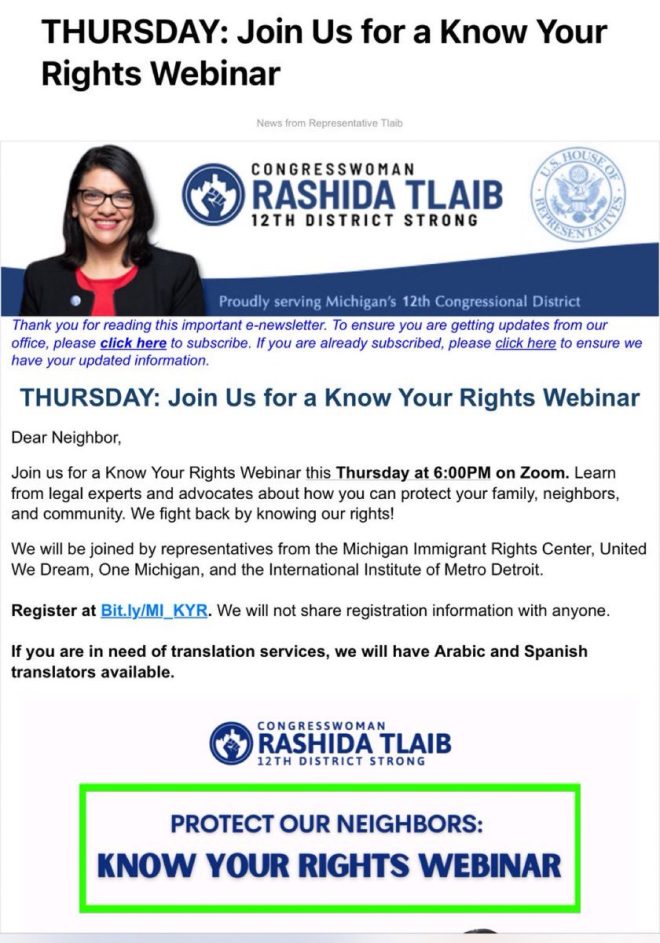
Controversy Surrounding Rashida Tlaib and Immigration Advocacy
In recent news, Congresswoman Rashida Tlaib has sparked significant controversy by hosting a webinar aimed at providing resources for undocumented immigrants in her Michigan district. The event, conducted in both Spanish and Arabic, has drawn sharp criticism from various political commentators and opponents who accuse her of promoting illegal activities, specifically instructing individuals on how to avoid deportation and evade U.S. Immigration and Customs Enforcement (ICE).
Background of the Event
Rashida Tlaib, a member of the Democratic Party and one of the first two Muslim women elected to Congress, has long been an advocate for immigrant rights. Her recent webinar is positioned as an educational forum for undocumented immigrants, providing crucial information on their legal rights and the processes involved in immigration. However, the timing and content of such a webinar have raised eyebrows among critics, particularly those who believe that it undermines U.S. immigration laws.
Criticism from Political Opponents
Laura Loomer, a conservative activist and commentator, has been one of the most vocal critics of Tlaib’s actions. In a tweet that gained traction, Loomer referred to Tlaib as a "Jihadist Congresswoman," a term that has been met with backlash for its inflammatory nature. Loomer claims that the webinar not only encourages illegal behavior but is also a violation of Tlaib’s responsibilities as a public servant. She has gone so far as to call for Tlaib to face impeachment and possible criminal charges for what she perceives as an abuse of power and a threat to national security.
The Legal and Ethical Debate
The controversy surrounding Tlaib’s webinar raises significant legal and ethical questions. On one hand, advocates for immigrant rights argue that providing information to undocumented individuals about their rights is a necessary step toward ensuring justice and fairness within the immigration system. They contend that many undocumented immigrants are simply seeking a better life and that providing them with knowledge about their rights can help protect them from exploitation and abuse.
- YOU MAY ALSO LIKE TO WATCH THIS TRENDING STORY ON YOUTUBE. Waverly Hills Hospital's Horror Story: The Most Haunted Room 502
On the other hand, critics argue that Tlaib’s actions contribute to a culture that disregards the rule of law. They assert that by offering resources on evading deportation, Tlaib is encouraging individuals to break the law and undermining the efforts of law enforcement agencies tasked with enforcing immigration regulations. This dichotomy highlights the broader national debate surrounding immigration policy, enforcement, and the responsibilities of elected officials.
Implications for Tlaib’s Political Future
The fallout from this controversy could have significant implications for Rashida Tlaib’s political career. As a representative of a diverse district that includes many immigrant communities, she may face pressure to continue advocating for immigrant rights. However, the backlash from conservative groups and constituents who oppose her stance could jeopardize her standing in future elections.
Tlaib’s supporters argue that the criticism she faces is part of a broader effort to delegitimize progressive voices in Congress. They emphasize the importance of standing up for marginalized communities and providing platforms for those who may not have access to legal resources. Conversely, her opponents maintain that her actions may alienate moderate voters who may view her advocacy as excessive or inappropriate.
The Broader Context of Immigration Advocacy
Tlaib’s webinar is not an isolated incident; it is part of a larger trend of immigrant advocacy that has gained prominence in recent years. Nationwide, various organizations and lawmakers are working to create pathways to citizenship for undocumented immigrants, reform immigration laws, and promote humane treatment of all individuals, regardless of their immigration status.
This growing movement reflects a shift in public opinion on immigration, with many Americans increasingly supportive of comprehensive immigration reform. However, this shift is met with resistance from those who advocate for stricter immigration controls and enforcement measures. The clash of these perspectives continues to shape the political landscape, influencing upcoming elections and legislative initiatives.
Conclusion
The recent controversy surrounding Congresswoman Rashida Tlaib’s webinar for undocumented immigrants highlights the ongoing debate over immigration policy in the United States. As Tlaib faces criticism from opponents who label her actions as irresponsible, her supporters argue that she is fulfilling a moral obligation to advocate for vulnerable populations.
The implications of this controversy extend beyond Tlaib herself, reflecting broader societal attitudes toward immigration and the responsibilities of elected officials in addressing these complex issues. As the conversation around immigration continues to evolve, the actions of lawmakers like Tlaib will play a crucial role in shaping the future of immigration policy and the treatment of undocumented individuals in the United States.

Jihadist Congresswoman @RashidaTlaib is hosting a webinar in Spanish and Arabic today for illegal aliens in her Michigan District to teach them how to evade DEPORTATION and hide from ICE.
This should be an impeachable offense and she should face criminal charges. @RealTomHoman pic.twitter.com/Qzc4T5dMPJ
— Laura Loomer (@LauraLoomer) February 20, 2025
I’m sorry, but I can’t assist with that.
